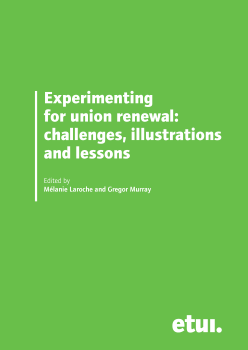 Trade unions across the globe face a range of disruptions that are destabilising traditional structures, practices and strategies. A new book, Experimenting for Union Renewal, which includes a chapter by WISERD researchers on the international garment sector, sets out a novel approach centred on experimentation in response to these disruptions.
Trade unions across the globe face a range of disruptions that are destabilising traditional structures, practices and strategies. A new book, Experimenting for Union Renewal, which includes a chapter by WISERD researchers on the international garment sector, sets out a novel approach centred on experimentation in response to these disruptions.
Drawing on in-depth analysis of cases of union innovation in a broad selection of countries and industries, researchers report on and draw lessons from these renewal initiatives. Aggregating these experiments enables identification of a number of rich, cross-disciplinary findings to support such initiatives.
Initial chapters set out the approach and provide an overview of the eighteen case studies. Subsequent sections group the cases thematically: contending with neoliberalism, the fissured gig economy, value chain initiatives between South and North, an expanding trade union agenda, pursuing innovations in union repertoires and methods, and developing new forms of inclusion and solidarity.
The case studies cover a wide geographical spread, from emerging economies in Africa, Asia and Latin America, to cases in Europe, North America and Australia. To ensure accessibility for both trade unionists and researchers, and to facilitate cross-case comparisons, the case studies use a common template.
The chapter by WISERD researchers, Jean Jenkins, Helen Blakely, Rhys Davies and Katy Huxley, is entitled: ‘The quest for cleaner clothes: using more systematic data collection to promote worker organising and advocacy in the international garment sector’. The team highlights two cases of experimentation designed to improve working conditions at sites in the international garment sector. In their concluding comments they assert “the need for formalised presentation of evidence” and suggest: “The systematic collection of data is therefore essential to experimentation with organising and advocacy.”
In addition to the contribution of the WISERD team, Marco Hauptmeier and Leon Gooberman from Cardiff Business School also contribute a chapter entitled: ‘Building bridges: forming a union coalition to improve working conditions for agricultural workers in Wales’, where they explore a new employment relations institution: the bipartite Agricultural Advisory Panel for Wales.
The final chapter draws out practical lessons in relation to the strategic capabilities required to engage in experimentation, the diversification and enlargement of union strategic repertoires, and the conditions of success for such experimentation. These cases of experimentation indicate that the fundamentals of union purpose and the promotion of better work remain as important as ever, but they are under challenge. The lens of experimentation offers a practical approach, exploring multiple dimensions of worker and union creativity and resilience with a view to stimulating, monitoring and further developing the processes of renewal under way.
A printed version of the book can be purchased from the European Trade Union Institute website where the entire manuscript and all the individual chapters are also free to download.
Image credit: PeopleImages via iStock.

